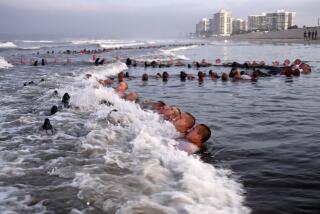Deaths Cloud Floating College : After Losing Children to Accidents, Parents Say Risks Weren’t Publicized; Officials Defend Program
- Share via
Circling the world for three months on an ocean liner while earning a semester’s worth of college credits has been a life-changing adventure for thousands of students who have joined the University of Pittsburgh’s Semester at Sea program.
But a recent handful of accidental deaths has some Southern California parents contending that the experience should come with a warning label.
For Gordon and Dona Crawford of La Canada Flintridge, the pain of their son Brett’s death in a hiking accident while on the program in 1993 came back in March.
That was when five Semester at Sea participants--one from Long Beach and another from the San Diego area--were killed in a bus crash during the ship’s visit to India.
“Losing a child is a uniquely painful experience. As I was lying in bed the night I heard about this year’s accident, I knew that a series of parents was embarking on that same horrible experience,” said Gordon Crawford, a financial executive.
By stopping in places such as Sri Lanka, Turkey, Morocco, Israel and South Africa, Semester at Sea allows students to see more countries and visit more remote locales than most study-abroad courses. It is one of the largest study-abroad programs and one of only a handful that takes students to more than one country.
Gordon Crawford acknowledges that “my son caused his own death; they didn’t cause it.”
But he asks: “Is it wise to take [hundreds of] kids who still think they’re indestructible and drop them off on their own in dangerous places?”
Semester at Sea officials say the program’s rewards far outweigh its risks and note that more than 25,000 students have been on the voyages.
“These things don’t happen every semester. We’ve never had an incident like the one in India,” said John P. Tymitz, director of the Institute for Shipboard Education, a nonprofit organization that administers the program.
Some parents of students who died this year said they were unaware of previous student deaths and that it never occurred to them to ask.
“I thought that certainly, because of the length of time it had been operating, that they would have every one of their safety ducks in a row,” said Charles Schewe, a University of Massachusetts professor whose daughter Sara, a Georgetown University junior, was among the four students and one adult participant killed in India on a bus expedition sponsored by the program.
Schewe, who teaches marketing, said Semester at Sea’s literature should have warned of the dangers of traveling abroad. “Any bottle of aspirin or any pharmaceutical product has a warning label,” he said.
Schewe and his wife came to Los Angeles last month for a two-day gathering of the parents of the students killed in India.
Ken Druck of Del Mar, the father of accident victim Jenna Druck, a University of Colorado senior, said the families got together “to heal.”
The parents of Cherese Laulhere, a UCLA student from Long Beach, and Virginia Amato, a University of Texas student from Metairie, La., said they were still too pained by their daughters’ deaths to be interviewed.
The Laulheres have retained Los Angeles lawyer Maurice Muehle, but Muehle said the family has not decided whether it will take any legal action.
*
Twice a year, Semester at Sea sends about 500 college students and 40 senior citizens on three-month voyages. On board, students take college courses taught by visiting instructors from various U.S. universities.
The last trip, which ended in May, took students to the Bahamas, Venezuela, Brazil, South Africa, Kenya, India, Vietnam, the Philippines, Hong Kong and Japan. The 617-foot converted cruise ship stops for three or four days at each port, where students can join group tours organized by the program or travel on their own.
The program costs from $12,580 to $14,880 depending on the type of room a student books. Students pay extra to join the group tours, which can cost up to $1,000 each. Those who have been on the program speak glowingly of traveling to so many countries.
“It completely turned my world around, and I’ve never met anyone who’s not become more compassionate and aware as a result of their experience,” said David Griswold, who has been on three Semester at Sea trips as both a student and staff member.
Griswold, 34, now lives near San Francisco and works as an importer of specialty coffees, a job that takes him on frequent trips to Latin America and Africa. He attributes his international lifestyle to the interests he formed in Semester at Sea.
Joshua Agajanian, 24, a University of Arizona student from Los Angeles who was a passenger on the bus that crashed in March, said he doesn’t hold the program responsible for the accident.
Agajanian said the crash, which took place at night on a winding road to the Taj Mahal, occurred after several near-collisions. “It was completely frightening,” he said of the drive through poorly lit streets crowded with people and animals, “but I hold the driver solely responsible.”
Semester at Sea is tied closely to Southern California. Chapman University in Orange sponsored the program from its start in 1963 to 1976, and a high percentage of current participants are from California.
University of Pittsburgh officials said they have no accident statistics from before their sponsorship of the program in 1981.
Shipboard education director Tymitz, who has worked for the program since 1972, said he knows of five student deaths other than those killed in March.
In 1974, a student died when he fell from a top deck of the ship. Bill Womack, a Chapman professor who was the ship’s dean of students in 1975, said the student “was under the influence of at least one drug.”
A student died in 1980 after falling from a pyramid in Egypt. In 1984, a student drowned in Sri Lanka.
The most recent deaths prior to the March accident were of the Crawfords’ son in 1993, and a Los Angeles-area student who committed suicide in 1995.
Tymitz said he does not believe Semester at Sea’s brochures, which are filled with color photographs of Third World destinations, need safety warnings. “We don’t want to paint a picture that everything’s dangerous; that’s just not true,” he said.
Until the March accident, student deaths in ports occurred when students ventured off on their own. The bus accident in India was the first fatal accident on a tour organized by Semester at Sea, Tymitz said.
According to Tymitz, students are briefed before arriving in each port about the hazards they may face. The program’s on-board staff contacts the U.S. Department of State regularly to keep apprised of conditions in countries on the itinerary, Tymitz said.
International studies experts say it’s difficult to judge whether the number of accidents is unusual.
Some people say Semester at Sea’s size and minimal admissions requirements make it difficult to control. A B-minus grade point average is required for admission. About 10% of applicants are rejected based on academic or personal criteria, Tymitz said.
Thomas Manley, director of international programs at Pitzer College in Claremont, said thorough admissions screening by study-abroad programs can help weed out students who might be prone to irresponsible behavior. Pitzer has run a program in Nepal for 20 years with no fatalities and sponsors programs in China, Zimbabwe, Turkey, Venezuela and northern Italy that have operated without any student deaths.
Acknowledging that “no amount of planning can preclude accidents from happening,” Manley said programs “need to make sure they select the students that are appropriate for these experiences.” Pitzer selects a small number of students through a process that includes essays, interviews and faculty recommendations.
Though alumni are quick to praise Semester at Sea, the program has a weak reputation at some colleges.
Several Los Angeles-area colleges, including USC, Occidental College and the Claremont Colleges, do not approve Semester at Sea as a study-abroad program for their students. As a result, undergraduates from those colleges cannot transfer their Semester at Sea grades--only their credits--to their home colleges. Nor are they able to use their financial aid awards from their schools toward Semester at Sea.
These colleges share the view of Constance Horak, director of overseas studies at USC, who tells students they are better off spending a longer period of time in a single country, preferably on a college campus.
Semester at Sea is “a wonderful trip around the world,” Horak said. “But it’s not a true study-abroad program.”
More to Read
Sign up for Essential California
The most important California stories and recommendations in your inbox every morning.
You may occasionally receive promotional content from the Los Angeles Times.













